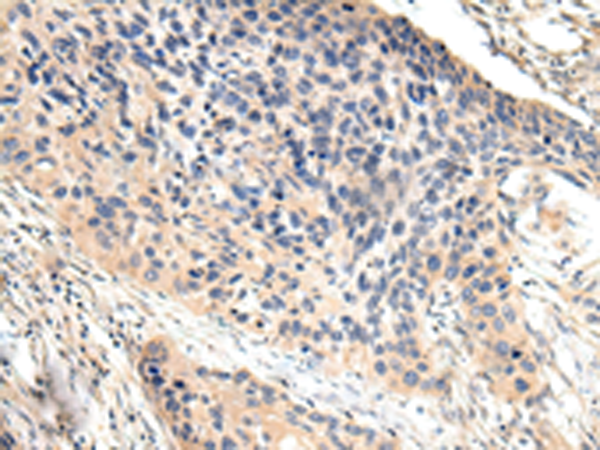

| WB | 咨询技术 | Human,Mouse,Rat |
| IF | 咨询技术 | Human,Mouse,Rat |
| IHC | 1/25-1/100 | Human,Mouse,Rat |
| ICC | 技术咨询 | Human,Mouse,Rat |
| FCM | 咨询技术 | Human,Mouse,Rat |
| Elisa | 1/2000-1/5000 | Human,Mouse,Rat |
| Aliases | CD106; INCAM-100 |
| Host/Isotype | Rabbit IgG |
| Antibody Type | Primary antibody |
| Storage | Store at 4°C short term. Aliquot and store at -20°C long term. Avoid freeze/thaw cycles. |
| Species Reactivity | Human, Mouse, Rat |
| Immunogen | Fusion protein of human VCAM1 |
| Formulation | Purified antibody in PBS with 0.05% sodium azide and 50% glycerol. |
+ +
以下是关于VCAM1抗体的3篇代表性文献及其摘要概括:
1. **文献名称**:VCAM-1 monoclonal antibody influences leukocyte recruitment and permeability in atherosclerotic plaques
**作者**:Cybulsky MI, et al.
**摘要**:该研究通过动物模型证明,抗VCAM1单克隆抗体可阻断白细胞与血管内皮细胞的黏附,减少动脉粥样硬化斑块中的炎症细胞浸润,并改善血管通透性,提示VCAM1抗体在抑制动脉硬化进展中的潜在治疗价值。
2. **文献名称**:VCAM-1 regulates immune cell migration during inflammation
**作者**:Cook-Mills JM, et al.
**摘要**:文章揭示了VCAM1在炎症过程中介导淋巴细胞和单核细胞迁移的分子机制,通过抗体阻断实验证实VCAM1与其配体α4β1整合素的相互作用是炎症部位免疫细胞募集的关键步骤。
3. **文献名称**:Soluble VCAM-1 as a biomarker for endothelial dysfunction
**作者**:Gerszten RE, et al.
**摘要**:研究利用抗VCAM1抗体检测循环中可溶性VCAM1水平,发现其与心血管疾病和糖尿病患者的血管内皮功能障碍显著相关,表明VCAM1抗体在疾病诊断和预后评估中的应用潜力。
4. **文献名称**:Anti-VCAM1-targeted nanoparticles for drug delivery in cancer therapy
**作者**:Huang X, et al.
**摘要**:该研究开发了一种靶向VCAM1的抗体偶联纳米颗粒,在肿瘤模型中成功增强药物在血管增生区域的靶向递送,抑制肿瘤生长,为VCAM1抗体在癌症治疗中的转化应用提供了新策略。
以上文献覆盖了VCAM1抗体在基础机制、疾病治疗和诊断工具开发中的关键研究进展。
VCAM1 (Vascular Cell Adhesion Molecule-1) is a cell surface glycoprotein belonging to the immunoglobulin superfamily, primarily expressed on vascular endothelial cells, macrophages, and certain epithelial cells. It plays a critical role in mediating leukocyte-endothelial adhesion during inflammatory responses by binding to integrins like α4β1 (VLA-4) on immune cells. This interaction facilitates leukocyte recruitment to sites of inflammation, contributing to immune surveillance and pathological processes such as atherosclerosis, rheumatoid arthritis, and cancer metastasis.
VCAM1 antibodies are tools designed to detect or modulate VCAM1 activity. In research, they are widely used to study endothelial activation, inflammation mechanisms, and disease progression. For example, monoclonal antibodies like clone 429 (M/K-2) enable VCAM1 detection in flow cytometry, immunohistochemistry, or Western blotting. In therapeutic contexts, VCAM1-blocking antibodies have been explored to inhibit leukocyte infiltration in inflammatory diseases or disrupt tumor-stroma interactions. However, their clinical translation remains limited, partly due to challenges in balancing efficacy with systemic immune modulation risks.
Elevated soluble VCAM1 levels in serum are also studied as biomarkers for endothelial dysfunction. Overall, VCAM1 antibodies serve as essential reagents for both mechanistic research and potential therapeutic development in inflammation-related pathologies.
×